Saturday, December 31, 2005
What They Said
--Bob Holman, Poemfone: New Word Order
“Anne Elliott is our fourth slammer. She has a classic Northern European look, which is an extraordinary contrast to the first three poets’ presences. Her projection is melodic, though her verse is a muscular line of thought woven delicately and interlaced with musical accents. She is ‘the all new Gregorian chant,’ as Holman has just characterized her from the stage. The audience has felt at one with his characterization, and indeed it is in sync with what we now begin to hear. Someone from the audience exclaims, ‘We are in the intestines of a dark devil!’ This judgment is anonymous, it is impossible to identify who among the 250 people present has said it, yet it goes directly to the heart of the matter.”
--Miguel Algarin, Aloud: Voices From the Nuyorican Poet’s Cafe
"Anne Elliott’s breakneck delivery may send the more techno-minded scrambling for their samplers.”
--Andrew Beaujon, College Music Journal
“Former Pussy Poet Elliott writes lucid, translucent dream-poems..."
--Evelyn McDonnell, The Village Voice
“...especially notable were Anne Elliott’s visceral renderings of stressful situations..."
--Ann Powers, The Village Voice
Thursday, December 29, 2005
No White Christmas for Wilbur

Poor dog, snow everywhere, and all of it slushy and gross. Wilbur didn't get his usual Buffalo Christmas of fluffy powder. What's a husky mix to do? He romped in the mud, and had way too many baths for his taste. I kept thinking of watching the Iditarod one year when they had little snow. Not too fun for the dogs. Or the mushers.
Speaking of mush, here's a tired dog taking a nap next to my mother-in-law's tree. Lots of twitching and rabbit chasing, which entertained us all, since there were no children present. We had to make do with sleeping dogs.

And I got to kiss my sister-in-law's rescued horse Sundance, who kept checking my parka pockets for cookies:
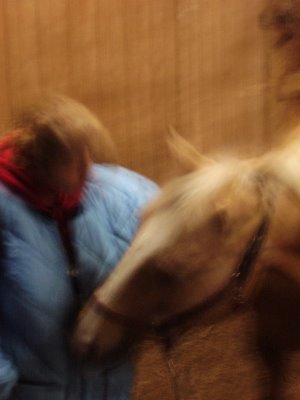
Wilbur helped my sweet husband with the driving too.

Proj Time: Cat's Cradle Improvements.

Well, I experimented. I've been fooling around with graph paper and colored pencils, making "Anatolian" designs for crocheted blankets. I was so inspired on our trip to Turkey last winter, been wanting to try this for awhile. Here's the first foray. I've figured out how to make it reversible with minimal loose threads to weave back in later. It's machine washable, Red Heart Light n Lofty, all single crochet. And I think Boo likes it.
(You can see a little of a hooked rag rug my great-grandmother made underneath the cradle. She was inspired by the Navajo. Guess this cross-cultural stealing runs in the family. Local technique, with bastardized-colonized pattern.)
Here's a clean shot of it before he ruins it with his damn shedding (you can see a hair on it already!)

The Tiny Lions in Winter
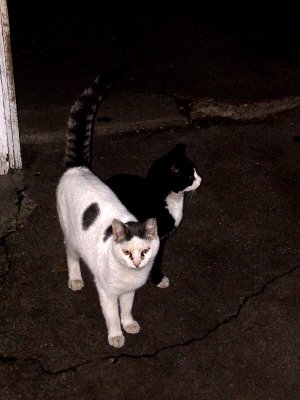
You may have been wondering how our little feral cat colony is doing now that temperatures have finally dropped. The good news is that all six are alive and appear to have no new health problems. We don't see too much of them, since it's too cold to wait on the stoop for food. They come round in small groups when the hunger bug strikes. All but Rrose are receptive to petting. Their fur is cold.
Feral cat specialists have all sorts of advice on helping the furry ones survive the season. Groovy shelters made of styrofoam home insulation, lined with straw, are the best. Of course, frozen water is another problem. There's no low-tech solution to that.
Our guys seem to have formed cliques this winter. Pictured is one clique, Junior and Elvis Memphis, who have been keeping each other warm in the rafters of our garage. Better digs are available, but these guys are too afraid of the bigger cats to learn. They seem to be the battered geek clique. I want to tell them it'll be so much better after high school, I swear!
Vince is a clique of one. He appears to be bunking in the basement of the apartment building next door. I think he gets along with someone human over there, who leaves a window ajar. He begs to come inside by the fire, and I think he might be ready. Anybody want a friendly, but aggressive, drooling cat? (He drools when he's happy. Part of the kneading ritual. Some cats hump, this one drools.)
And the other three, Rrosie, Marcel, and Elvis Vegas, appear to be hiding out somewhere down the block, probably the same spot where Rrose used to go to give birth. Haven't figured out where, but it's likely a doghouse or warmer garage.
Meanwhile, the indoor crew is doing its best to keep the gas bill down, piling on top of us at bedtime in a big, snoring mass. Sweet dreams.
Wednesday, December 21, 2005
It's Really Happening
Of course I'm reacting to people in the news media, because I haven't yet joined the fray myself. I'm telecommuting. Which from a vain New Yorker point of view is a totally pansy approach. I was thinking I could make my husband drive me to the 59th Street bridge, then I'll walk over. Or try to hitch a ride with strangers from one of the carpool staging areas. Then I'll be One of Them! The strong people walking over bridges and meeting strangers!
But it doesn't make financial sense, using that gas, taking all that time, when I have a perfectly good net connection at home. So I stole my husband's comfortable desk chair, and I'm actually getting a lot of dayjob work done. I'm about to login now, so no more web for me today.
Therefore, no exciting strike stories from me, at least not yet. For kicks, I've been checking in on Overheard in New York.
Saturday, December 17, 2005
Tuesday, December 06, 2005
The Thaddeus Touch
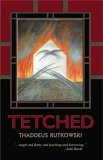 I'll be honest: I'm biased, I planned to like TETCHED, Thaddeus Rutkowski's latest novel, and it went according to plan. I'm a fan of Rutkowski's fragments or "fractals," kernels of prose inside chapters and sections that echo the smaller kernels. Reading Rutkowski is like opening a matrioshka doll, playing with the parts, then putting her back together.
I'll be honest: I'm biased, I planned to like TETCHED, Thaddeus Rutkowski's latest novel, and it went according to plan. I'm a fan of Rutkowski's fragments or "fractals," kernels of prose inside chapters and sections that echo the smaller kernels. Reading Rutkowski is like opening a matrioshka doll, playing with the parts, then putting her back together.For fans of Rutkowski's first novel, ROUGHHOUSE, the first half of TETCHED returns to that home territory. We hang with the Caucasian, loose-cannon, stay-at-home father, who plots armed revolution, drinks, brings a drifter into the house, and blames his failed art career on his kids. We savor moments with the pragmatic, but enigmatic Chinese mother, who blends her medical knowledge with cryptic stories from her childhood. And we anchor ourselves to the loveable, unnamed narrator, an ethnic anomaly in his rural high school, who has a pyro streak and explores issues of control (and lack thereof) with his own body, through self-torture.
What makes TETCHED and the rest of Rutkowsi's oevre remarkable to me is the emotionally cool tone of the "fractals" of text. It is not cool-for-coolness'-sake. The unsafe terrain of home is inherently charged, and could become melodramatic in the telling. But the language here has an organic humor akin to the self-experimentation of its narrator, more curiosity than wit, more let's-see-what-happens than let-me-tell-you-what-happened. Instead of hearing a confession, we get to experience the snapshots of memory from a simultaneously detached and internal place.
The effect of this choice is interesting: instead of responding to emotional promptings in the text, I have a response to the cumulative effect of the cool-curious moments. In the case of ROUGHHOUSE I closed the book with a feeling of melancholy. (A friend had a similar reaction: she "just wanted to hug" the protag.) But in the case of TETCHED, while the material is similar in content, the emotional effect, for me, was far different. The key is in how Rutkowski arranges the pieces. TETCHED has a certain giddy glow.
The narrator of TETCHED does manage to escape the tyrrany of his childhood homestead, but he keeps his bondage/pain fetish, and artfully refines it. This is book is from the lighter, left-field category of bondage-lit, and this protagonist is one resourceful guy.
I won't give away too much more, but I will recommend. It's an especially good read for fiction writers transitioning from shorter to longer works, who might find his approach mechanically instructive. If you're not a Rutkowski fan yet, get a taste at one of these publications: Land-Grant College Review or Small Spiral Notebook.
Sunday, December 04, 2005
I'll Be Reading December 11 and 13
I'll read my own stuff, probably fiction, in my own borough, which I like. Sunday Salon Series, 7PM, 766 grand street, Brooklyn, 11211(L to Grand, 1 block west). My coreaders are Jackson Taylor, Ellis Avery, and Thomas Hopkins. More info at the link.
December 13:
I'll be reading a story by Max Ruback, who is unable to attend to represent Zing magazine at CLMP's Periodically Speaking series. I'm so stoked to be on the mic at the NYPL, I can't tell you, and honored that Max asked me. Also repped will be Tin House and Mad Hatter's Review. It's 6 - 7:30 pm in the DeWitt Wallace Periodical Room of The New York Public Library's Humanities and Social Sciences Library at Fifth Avenue and 42nd St. (Please use Fifth Avenue entrance). For more information, call 212.930.0876. Free.
Thursday, December 01, 2005
Indie Press Book Fair--Shopportunity!
Wednesday, November 23, 2005
This Stuffing--I Mean Dressing--Looks Awesome!
Don't Submit Until Dec 4, I've Been Told
I don't hold much stock in astrology, given that I share a birthday with Vladimir Putin and Ollie North, and I'd like to think I share nothing more with those individuals. But evidence of Mercury in retrograde has been abundant this week. And it's been pushing my buttons. A sample:
1. My day job has been Sisyphusian and ridiculous. I've been trying to facilitate a simple data request with a counterparty, and have been unable to do so effectively, nor to understand their product explanations. It has involved long conference calls with lots of friendly and professional but also exasperated parties, email waylaid in spam folders, and me trying to translate traderspeak into programmerspeak, which is usually my forte. So I show no progress whatsoever, while my bosses are away this week, and when the cat's away, dammit, this mouse likes to catch up. Some traction, but not much. I ended up crying into my keyboard Monday. What a pathetic Libra careerwoman I make!
2. Wilbur needs a prescription, and my hubby could not find parking in Park Slope, a rather oxymoronically-named hood, for 45 minutes. Finally parks, hikes, goes inside, and the scrips promised ready on the phone aren't all there. So I confirm readiness again on the phone, go in myself, and they've filled it with something else. Maybe Friday?
(I interject: I don't blame people at the vet's office. I don't blame the contacts at work. This is all miscommunication, which I thought was my fault, but now I blame Mercury. )
3. Hubby had a 4-hour layover in Philly on Saturday, so we said ha! I'll drive down to meet him instead of the Laguardia pickup. Staten Island alone took 4 hours to cross (2 each way), prompting this control freak to bang her hand uselessly on the steering wheel.
(Interject: I kind of blame Staten Island. I know, that's prejudiced.)
4. Tons of little crap. Numerous work problems--upload/download failures, communication snafus, and this is with people I know well and love. My subway rerouted to from East Side to West. Uploading homework to my work machine, only to find it corrupted on the other end, so I go to class empty-handed. (See what I get for printing at work? Bad girl.) Zoetrope.com appears to be down (I won't bother linking for obvious reasons). Even the daffodils in the garden are confused--why are they sprouting in November? No joke.
Anyone else completely rattled and overwhelmed with trivial and/or bourgeouis difficulties this week, like traffic? It's not your fault! We have common enemy: the planet Mercury! And as I go into Turkey Day, I remind myself there's plenty to be thankful for:
1. I have a great damn job, where my paychecks don't bounce, and they even buy me lunch.
2. Wilbur's skin problem has been biopsied and diagnosed as an allergy, not a serious disease.
3. Most important: my sweet, smart, funny husband got back from Europe in one piece. And I should quit taking him for granted. Baby, I love you!
Friday, November 18, 2005
Literary Classics Condensed to Text Message
Quiz, what novel is this:
Jane&MrRochster(eventuly)Fal4EachOtha.
Bt,DayOfWedin,
ItTurnsOutHeAlredyHasAWyfInThAtikHuIsMad.
Can I pay them to do this for my bloated novel? I need a new tagline.
Tuesday, November 15, 2005
Kitty Porn?
Monday, November 14, 2005
Paris is More Than Just Burning
In my opinion, for example, today's European hip-hop is leaving American mainstream hip-hop in the dust. Just listen to Excuse My French, a radio program out of Brighton, England, highlighting some cutting-edge stuff coming out of France.
Sunday, November 13, 2005
Finally Read the Smiley Book
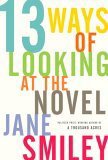
After a couple weeks on a NYPL wait list, I finally got my hands on Jane Smiley's 13 WAYS OF LOOKING AT THE NOVEL, and I'll barely finish it in time to return it. It's big, it's dense, and it's been worth every second of my time. And I can't just renew it, it's a hot ticket item in our burg. (Question, are all the others on the waiting list writers too? Just how many of us are there?)
I'm buying it when it comes out in paperback, because it's a great reference book for any writer's shelf. Smiley read 100 novels, from THE TALE OF GENJI to WHITE TEETH, and recaps each in the 300-page 13th chapter of the 570-page book. While Smiley's recaps do fit the novels into a historical continuum, they are not academic. They are experiential, and come from a love of reading.
Smiley's list goes beyond the canon of American literary education, and she's got me jazzed to read a few older works I hadn't heard of before: THE HEPTAMERON, by Marguerite de Navarre; ZENO'S CONSCIENCE by Italo Svevo; KRISTEN LAVRANSDATTER, by Sigrid Undset. (All of these happen to be works in translation, and Smiley provides info on the edition of each novel she read.) I'm also inspired to read some more familiar stuff I never got around to: Proust's 7-volume quasi memoir (Smiley calls his narrator a "kindly narcissist"), and Forster's A PASSAGE TO INDIA, which has themes of particular interest in contemporary times, with the legacy of colonialism still playing out in our daily lives.
Her recaps are daring too. I nearly gasped when I read her suggestion that THE GREAT GATSBY should have been 100 pages longer, that it suffers from the shallow-character problem shared by many writers in their twenties. After so many years of living in the standard assumption that GATSBY is the pinnacle of American literary achievement, it was refreshing to hear this opinion, and in retrospect, it rings true to me.
The first 12 chapters of Smiley's book are thematic ruminations on the novel and its evolution. She defines the novel as a "lengthy prose narrative with a protagonist," which is the bare skeleton of this big analysis. One of the most interesting themes that she returns to repeatedly in the first 12 chapters is women and marriage, or the big question: can a woman act on her desires and still be virtuous?
My favorite of the thematic chapters is a case study of her writing process for GOOD FAITH. In a way, the relationship between a writer and her work is like romantic love: sometimes it's a honeymoon, sometimes it's a matter of pragmatism and/or habit. GOOD FAITH wasn't one of her honeymoon books, and since I'm in the process of revising a novel I kind of can't stand, this chapter comes at a very good time for me. Smiley advises:
If the novelist especially likes a book or feels a kinship to it, his attachments blind him to the independence of the novel and make him feel that his views about the novel are more primary or more important than other readers' views. In fact, they are only different. When I published a novel that I was satisfied with but did not like, I saw that no novel can help communicating many things to every reader, and that the novelist's ideas about what is being communicated are as valid as any reader's ideas, but no more so.
Thanks, Ms. Smiley, for helping me over this hump. And reminding me that I don't have to be on a honeymoon with this darn writing project every second of the day. That it may still have value, even though it's hard to see through the haze between me and my screen. And that I don't have to be in charge of what that value is. I only have to write the story.
I highly recommend this book, especially if you are working on a novel. Makes me realize how much the workshop system is skewed to short stories, which is a little strange given the appetite of most of the reading public for longer works. It's helpful to focus on "what is a novel" for 570 pages, to remind myself that everything can't be a honed, compact nugget. Some things need to spread out and breathe. And some writing projects take years, not months.
P.S. Check out Smiley's radio interview with Michael Silverblatt...
Wednesday, November 09, 2005
New Uke Stokedness.

Here's my cute husband holding my new uke, which is so cool I won't even have to know how to play it. Just plug it in, throw some distortion on, and stand there with a sustained chord, and the audience will be right there with me!
OK, so gimmicks like that don't last. Time to start practicing and getting used to this thing. It's a real different feel from the acoustic uke, but now I can do more with pulling-off/hammering on the fretboard, so possibilities are endless. It doesn't really sound like a uke, and not really an electric guitar either. Closest thing maybe is an electric mandolin (which of course does not sound like a mandolin).
I'm researching MP3 hosts so I can share some songs with y'all. Host recommendations welcome. Especially free ones.
Willie had to check it out too. "Woof!" Translation: "My dog has fleas!"

Friday, November 04, 2005
New Ukulele On Its Way! Celebrating.
(I'll save pics for when it arrives.)
In the meantime, enjoy with me these episodes of Midnight Ukulele Disco.
Tuesday, November 01, 2005
Mucho Literary Weekend, November 5 & 6!
Care to join me on any of these NYC literary excursions? It's a conflagration of interesting readers. I'm going to both of these, maybe I'll see you there. I'll probably be the one with the Hello Kitty accessories and/or loud crowd.
Sat. November 5 - 6:00PM
ZIRYAB: THE ARAB-AMERICAN WRITERS ASSOCIATION
Featuring:
Poet & playwright NATHALIE HANDAL, author of The Lives of Rain and The Neverfield
SHOLEH WOLPE, poet and author of The Scar Saloon
LAILA LALAMI, author of Hope and other Dangerous Pursuits and the popular blog Moorishgirl
Poet, educator, & activist MATTHEW SHENODA, author of Somewhere Else
Host: Nada Taib
Cornelia St. Cafe
29 Cornelia St.
212.989.9319
Cover $8 (includes one house drink)
November 6th - 7p.m.
ATOMIC READING SERIES
featuring:
LISA SELIN DAVIS, author of the novel Belly
ANDY HORWITZ, professional Potty Mouth and author of groovy blog Andy's Chest
CHRISTINE HAMM, poet who grows literary culture in a milk carton
TSAURAH LITZKY, icon of literary erotica
Curated and Hosted by Cheryl B., brilliant memoirist & keeper of The B List.
Lucky 13 Saloon
273 13th St. (5th Ave.)
Park Slope, Brooklyn
FREE
A Cure for My-People-Are-At-Work Blues?

Willie, my guest blogger, says: "I miss my people! This cat (Angus, see behind) is only interested in playing with string! Maybe I'll login to DogCatRadio for some upbeat pop music and barking interludes!"
Friday, October 28, 2005
Halloween Cake for Cat Lovers
Willie our dog would probably prefer to eat from the real cat box, but for the rest of us, this is the shit!
Thursday, October 27, 2005
Why I Love Brooklyn...It's the Dirt

So I actually read my snail mail a couple weeks ago and saw the announcement for compost give-back from the NYC Sanitation Department. They have a compost facility way the heck out in Canarsie, and I drove out there with a bunch of bags in the back of the Subaru Wagon.
It was one of those cool cross-sections of NYC, like the subway. People of all shapes, sizes, colors, and languages, shoveling the free compost into bags. A guy from New York's Strongest helped me load a half a dozen bags. Here's how it looks in our garden! The lasagna bed is coming along: a layer of newspaper, then peat moss, then topsoil, then fireplace ashes (I'm improvising now) and now compost. Maybe we'll be able to grow some great heirloom veggies next year!
Wilbur chimed in with his opinion. WOOF! Translation: "I LOVE DIRT!"

WORD BY WORD on Podcast
Today I listened to her wonderful 10/17 interview with TC Boyle. A great focus on process and the writing life, including Boyle reading an excerpt of a story. Boyle downplays his prolific writing life, makes it sound like the most fun job in the world. He also speaks frankly about talent, and about how the lucky folks are the ones who figure out what their talents are.
(I have no idea what my talents are. I only know I enjoy writing, even though it may prove to be more hobby than vocation. All I know is I'm having fun. And struggling, too, but mostly having fun.)
If you haven't heard her shows yet, Rosenfeld is an insightful interviewer, focusing not only on the work, but on the day-to-day of writing, nuts and bolts stuff that we writers crave. This writer anyway.
Here's how to get it into iTunes (and you techies, don't laugh at me):
1. go to http://krcb.podgram.net/
2. in iTunes, the Advanced menu, click Subsribe to Podcast.
3. copy or drag the url next to Jordan's beautiful picture into the iTunes dialog box.
I don't recommend using KRCB's application Personal Translator (please, no offense). I tried it, and it didn't work well with my other applications open. This is necessary if you're going to listen to internet radio at work.
Thank god for public radio, and thanks to Jordan Rosenfeld for a great program.
Wednesday, October 26, 2005
Calling All Catamounts: Shteyngart Interviews Lipsyte
 If you are like me and fell in love with Teabag in Sam Lipsyte's HOME LAND, then check out this interview on Loggernaut. Gary Shteyngart, author of the hilarious RUSSIAN DEBUTANTE'S HANDBOOK, pulls perfect morsels out of Lipsyte's work, like:
If you are like me and fell in love with Teabag in Sam Lipsyte's HOME LAND, then check out this interview on Loggernaut. Gary Shteyngart, author of the hilarious RUSSIAN DEBUTANTE'S HANDBOOK, pulls perfect morsels out of Lipsyte's work, like:This is Teabag speaking to his principal, Mr. Fontana: "Some nights I picture myself naked, covered in napalm, running down the street. But then it's not napalm. It's apple butter. And it's not a street. It's my mother."
It's the jarring nonsequiturs and mother-love that makes Teabag, and other Lipsyte protags, win my heart. I went all over NYC looking for VENUS DRIVE, and where do I find it? In Istanbul, Turkey. Groovy UK edition. I know I'm not alone in my Cult of Lipsyte, and if you're not onboard, please, get with the program.
And Shteyngart, he's no slouch either, a pioneer (and probably the funniest) in the new milennium's Russian-American literary movement. My favorite moment in RUSSIAN DEBUTANTE:
"Vladimir, how can I say this? Please, don't be cross with me. I know you'll be cross with me, you're such a soft young man. But if I don't tell you the truth, will I be fulfilling my motherly duties? No, I will not. The truth then..." She sighed deeply, an alarming sigh, the sigh of exhaling the last doubt, the sigh of preparing for battle. "Vladimir," she said, "you walk like a Jew."

Another mom moment. And they do discuss Jewish fiction in the interview, the "done" American version, and the newer, immigrant version. I'm not a Jew, I'm not qualified to rehash or analyze. Only to recommend.
Sunday, October 23, 2005
Bombay by the Pound; or, I Can't Believe I Ate the Whole Thing

Well, I just finished the first of my literary birthday gifts, this one from a friend visiting from Mumbai. He said, "This really captures the feeling of Bombay," then handed me the 935 page, 2lb-11oz paperback UK edition of Gregory David Roberts' SHANTARAM. Unbeknownst to me, it is an international bestseller. My friend noticed my discomfort at the size of the book: "Just read the first 100 pages, it's worth it."
I trust this friend, and I am curious about Bombay. But more than that, I'm curious about what makes this material warrant the book's absurd scale. My first novel, which at a mere 120 thousand words (about 350 print pages) has been called "big" and "sprawling" in the nicest and most helpful ways by those rejecting it, will probably never see print in its current configuration. So what does SHANTARAM have that made publishers ignore its violation of the cardinal rule of debut fiction: keep it simple?
In a word: PLATFORM. This is an autobiographical novel with one of the best author platforms I have ever seen. Roberts was a reformed heroin addict in an Australia prison, doing a hefty sentence for armed robbery. He escaped prison, went to India on a fake New Zealand passport, toured India and learned to speak Marathi, Hindi, and Urdu like a native, lived in a Bombay slum where he opened a free clinic, joined the Bombay mafia and worked in black market currency and passports, dabbled in the Bollywood movie biz, went on a gunrunning mission in Afghanistan during the war with Russia, eventually got caught in Europe, and then served out his remaining sentence for the Australia crimes. In the book's acknowledgements, he notes that 600 pages of his original manuscript, penned in prison, were lost.
(Meaning the story was supposed to be 1500 pages?)
I'll try not to bitch about the length, especially since it's what kept me reading. That nagging question: why is it so big? I concluded that it simply suffers from the problem that many autobiographical first novels suffer, the need to include every good idea, every insight, every interesting character, as if there will be no more novels after this one. And while I did find myself wishing Roberts had saved some of the material for his next opus, I must concede that it feels well-researched, and it REALLY makes me want to go to Bombay. The book's architecture is meandering, but so are the slums of Bombay, and so I'll cut him some slack.
Some critics have complained about Roberts' "larger than life" characters, which is a term I'm struggling with now. As in too colorful, too implausible? If so, I disagree. I, like Roberts, am a person who is drawn to weirdos. They do exist. There is no need to write bland characters, or to be bland in life.
But if "larger than life" means cliche, then maybe I see critics' point. One does get tired of hearing about the winning smile of Prabaker, the protag's first friend in India, or the liquid green eyes of Karla, the aloof love interest. But so what. This book is a ride. A long, long, ride, like a Bollywood movie, complete with bad guys and a dancing bear. So maybe the movie could be edited. Maybe the hero wins too many battles or has too much flowery, good sex. (I mean really, no fumbling or bumbling? No icky fluids?) So what if it falls into that story paradigm of cross-cultural searching and assimilation. My Indian friend wasn't offended. It's a little like Roberts' take on visiting India: you just gotta trust and ride.
Aside: while I was reading this book, I noticed Vikram Chandra sold a 1200-page novel about the Bombay crime and movie underworld. Is this becoming a genre? The Bombay supernovel?
Friday, October 21, 2005
Let's Go Get Some Dogs at Nathan's!
What's this German Shepherd doing on top of Nathan's Famous in Coney Island? What else? BEGGING.
We had a great visit with my folks, just now getting through the pics. The boardwalk, Turkish dinner at Sahara, Brooklyn Botanic Garden. Hey, we even went into Manhattan a little, to check out the Russia show at the Guggenheim.
HEY, YOU GONNA EAT THAT?

This Is NOT a Cat

My husband happened to catch this critter hanging out on top of our garage. He's absolutely fearless. He menaces the feral cats. One night recently I was walking home and he was coming the other way. At first I thought it was Vince. Then I realized this guy was rounder, with a bushier tail and a pointier nose. And then he walked right past me on the sidewalk as if I didn't exist. I thought, OK, you are a real New York raccoon, you even have the street etiquette down.
I am very glad all our feral kitties have their rabies shots.
Is this really Brooklyn? We've seen squirrels, possum, and raccoon in our yard...what's next? Please don't say skunk.
Thursday, October 20, 2005
Digging Through the Mothballs.
I take it as a dare. How else can I?
Mine's not as pride-worthy as hers, but it's still fun to dig through the mothballs of my memory. (Since this is seriously four computers ago and my brain's the only place it is stored.) Drumroll...here's my old pathetic lust-poem, practically old enough to vote. And I'm NOT reading this tonight at KGB.
indelible
i want to get under your skin
like your needle
fat with ink
that penetrates
in and again and again
and when you wipe your blood away you find
those pricks have intercoursed to lines
you and I are Celtic
carved in flesh of your bicep
arms and legs woven
under or over
or around or
inside out
arms and legs that don't fit
neatly into
prepositions
but fall square in their own design
a labyrinth of sins
where your skin ends
an mine begins
Friday, October 14, 2005
Reading and Some Auld Lang Syne
RETURN OF (SOME OF) THE PUSSY POETS!
with
Anne Elliott
Janice Erlbaum
Gloria
with your hostess, Kathleen Warnock
Thursday, October 20, 7pm.
FREE.
KGB Bar85 E. 4th St.NYC
www.kgbbar.com
THE PUSSY POETS were a gang of five loudmouth women out to prove feminists didn't have to be puritans. They got together in 1992, made a big splash, performed throughout the city, got their pictures in a few magazines, and then, having used up their 15 minutes of notoriety, imploded in 1993.
Three of the former members will be reading Oct 20th: Gloria, now vocalist for the band Kanipchen-Fit; Janice Erlbaum, author of Girlbomb: A Halfway Homeless Memoir (forthcoming from Villard!); and Anne Elliott, now ukulelist, fiction writer, and publisher of Big Fat Press.
Wednesday, October 12, 2005
Introducing...the Blooker Prize!
Sunday, October 09, 2005
Our Version of Preparedness

When one is at a loss for blog content, the easiest thing to do is just put clothes on the animals and take their picture.
This new rain slicker proved very useful in the big downpour we had on Saturday. No more wet dog trying to jump on the bed!
I was hoping to use the weekend to make the garden prettier in advance of my folks visit, but Mother Nature told me to stay indoors. For the most part, I obeyed, and the plants outside are looking pretty happy from the rain.
Friday, October 07, 2005
Me and Sherman Alexie: 39
Me, I think it feels good to teeter on the precipice of adulthood. Almost there. Perpetually.
Here’s the planned celebration (just me and hubby): a nice Japanese dinner in Far Brooklyn, and playing with my new electric ukulele, if it arrives on time. And my folks are coming to visit next week too! Life is good.
Thursday, October 06, 2005
Saunders: Fables, Crippled Diction, Genocide, and Happy Face
The subject is Saunders' new novella, THE BRIEF AND FRIGHTENING REIGN OF PHIL, and the discussion turns (how can it not?) to Saunders' interest in the institutional language that accompanies lying. From corporate cover-ups to ethnic cleansing.
Silverblatt observes that Saunders' "laughter language" always is "characterized by profuse overadequacy to its situation." But that the "tear language"--which is the same language--is inadequate to its situation. Here's a snippet:
Silverblatt:
The stories are engineered so that the things that made you laugh suddenly have a second side, an ulterior motive...
Saunders:
As they say in Chicago they come back to bite you in the ass.
Silverblatt:
That's what they say. And suddenly you feel guilty for having laughed so easily. The stories are meant, I think, to let the reader feel an uncomfortable guilt at how much is assumed by easy language.
Saunders:
I was thinking about the fact that I am a very sentimental person. I mean, Kahlil Gibran was a tough guy, compared to me. And I am also very conscious that I want to be liked all the time. That's my number one thing. Also I'm not all that crazy about myself. I'm very anxious about myself. So when you put those things together, it kinda makes sense--and I can feel myself doing it--that you're going to keep a "happy face," that language-attentiveness-to-style as a form of a "happy face" thing, and I think that when those "tear" moments come they always surprise me. It's not planned, but I think it's the inevitable outcome of somebody who is keeping too stiff a back.
Very humbling to hear Saunders talk like this. Also to hear his spot-on impersonation of Valley-speak, to illustrate the kind of real-world language he has grown to value, following, in a way, the American tradition of Mark Twain.
I won't rehash more. But do listen.
Tuesday, October 04, 2005
My Antonia and Book-Flinging Syndrome
But each time I sit down to write about this book, I get stuck on this paragraph:
"Good evening, gentlemen. No ladies here? Good evening, gentlemen. We going to have a little music? Some of you gentlemen going to play for me this evening?" It was the soft, amiable Negro voice, like those I remembered from early childhood, with the note of docile subservience in it. He had the Negro head, too; almost no head at all, nothing behind the ears but folds of neck under close-clipped wool. He would have been repulsive if his face had not been so kindly and happy. It was the happiest face I had seen since I left Virginia.
Oh my. It's hard to keep from flinging the book across the subway car and grabbing the bible of the lady next to me, just to rinse out my brain. Cather has broken almost every modern rule of sensitive depiction: from the love-our-darkies Southern nostalgia to the farm-animal comparison. ("Wool?") Okay. Deep breath. Read on. It's an old book, remember?
Cather's Jim goes on to describe how this black man became a pianist, and the story is compelling and fairly sensitive. As a little boy, this servant's son, blind, eavesdrops on the piano lesson of this young rich (white) girl. When he hears everyone leave the room, he sneaks in through the window and imitates what he has just heard on the keyboard. The teacher and the student both recognize the boy's talent, and nurture it through advanced classical schooling. The poor maid's son becomes a piano-playing star.
Cather was as PC liberal as it got back her day. Butch, almost-out lesbian, always striving for diversity in her fiction, depicting Latinos, Eastern Europeans, and Scandinavians, both poor and wealthy, with a level of sensitivity we expect even in today's literature. So how on earth did this one sickening paragraph make it into print?
Truth is--and this is what I fear--the most earnest among us cannot see our prejudice. We can't predict the evolution of language. (Look what's happened to "queer" and "nigga" in the last 20 years.) What is provacative in one way today will likely be provocative in another way tomorrow. What's harmless background music today will become tomorrow's hurtful cliche. Our words outlive us. Can we trust future literary historians to cut us some slack?
And what other solution is there for writers? Should we avoid writing about diverse populations for fear of accidentally offensive language? If we believe in diversity and tolerance, isn't this kind of segregation a scarier solution? If it's "write what you know," are we only allowed to "know" people who are exactly like us? (Which is pretty near impossible in my neighborhood?)
Or, do we do like Cather and dive into the work, and make peace with the fact that we will probably offend some day? Isn't clumsy writing about race better than none at all?
I've decided to cut MY ANTONIA a little slack--maybe my white skin makes it easier--after all, HUCKLEBERRY FINN has been cut slack for years. And I've decided to cut myself some slack too. Ethnically diverse characters carry specific risks for writers of any race, primarily the big narrative cliches: fascination with "other," the collecter/colonialist/Jungle Fever syndrome. Or the opposite: the story of triumphant assimilation--How I Became a Real American Too--LOOK! ALL HUMANS ARE THE SAME!
For me, the truth is somewhere in the middle, in the awkward, painful moments when characters notice their own prejudices. Like this one, from MY ANTONIA:
Mr. Shimerda rose, crossed himself, and quietly knelt down before the [Christmas] tree, his head sunk forward. His long body formed a letter "S." I saw grandmother look apprehensively at grandfather. He was rather narrow in religious matters, and sometimes spoke out and hurt people's feelings. There had been nothing strange about the tree before, but now, with some one kneeling before it--images, candles...grandfather merely put his finger-tips to his brow and bowed his venerable head, thus Protestantizing the atmosphere.
and after Shimerda leaves Jim's house:
As we turned back to the sitting-room, grandfather looked at me searchingly. "The prayers of all good people are good," he said quietly.
This is overwhelmingly the message of the novel, that the immigrants teach as much as they need teaching, and that the learning is humbling for all involved. I heartily recommend MY ANTONIA, for the history lesson, for the voice, and for the fleshy primary characters. But you might want to skip page 118.
(Depending on your edition, of course...)
Sunday, October 02, 2005
Regie's Gone Academic, But Keeps It Real
A/P/A Studies' 2005-06 Artist-in-Residence, Regie Cabico, presents his latest comedic spoken word and poetry featuring works developed for The NY Neo-Futurist Production of Too Much Light Makes the Baby Go Blind including “Godiva Dates” and “A One Night Stand,” “Lucifer Does Standup Comedy in the Garden of Paradise” and “If I Write a Play About This Dildo It Will Be a Tax Write Off Plus a Political Shot In 1 Act.”
More info here.
Friday, September 30, 2005
Am I Dreaming Political Metaphors Now?
So I'm in the back seat of the Lincoln Town Car and I realize he is an awesome driver. We're darting through NYC traffic like it's nothing. Comforted by his competence, and overtired, I doze off. When I wake up, we are on some kind of bridge, going like 200 MPH. It is dark. I see an unfamiliar city in the distance. I'm a little scared by the speed, but too drowsy to do anything about it.
We're supposed to pick up my friend in suburban Jersey. "You know how to get there, right?" I say.
"No, I've never been there before." He takes out a map of New Jersey that is like a primary school cartoon, four lines on an index card.
"That's your only map?"
"I never had any problem before."
Oh. I don't have directions, and I can't remember how to get there. "Let's call her," I say. "Surprise her. She'll get a kick out of talking to you."
He laughs, but doesn't want to call her. He pulls over and lets me out, saying, "OK, you look that way, and I'll look the other way." Drives off.
So I look for a landmark, something that will help me get to my friend's house. I find myself in a beautiful forest with a lake. But it doesn't look familiar. I backtrack, and end up at a gas station. The Lincoln is parked out front. Arnold is on the pay phone, screaming at someone, waving his kiddie map in his hand.
I walk up to his bodyguard (who suddenly materializes in the story) and say, "Good, I'm glad I found you guys. We should never have split up."
"He does this," says the bodyguard with a shrug.
(I don't KNOW if we ever get to Philly, because Boo Boo decided to crawl under the covers and wake me up. But something tells me we never get there. Just drive eternally, through suburban Jersey, with the lights of the unknown city on the horizon.)
PLEASE TELL ME THIS DOESN'T MAKE ME A REPUBLICAN.
(The car is, after all, a LINCOLN.)
Wednesday, September 28, 2005
Pets vs. Furniture: It's Rigged.

There's no contest here, the cat is that big. The couch is ruined. And it's not the first one: when the dog was a puppy, he used to take a running dive into our last couch, leaving an impact hole in its center. We've given up on regular upholstered furniture, opting instead for adirondack chairs and the like. Clockwise from top left: Boo Boo (aka Porkchop), Wilbur, and Angus (indoor brother of Vince).
Boo Boo, though obese, has gotten a clean bill of health from the vet. Go figure. Despite his girth, he does turn into Action Kitty when there are creatures to hunt. Or little brothers to boss around. Or dogs to box. I think it's part of his dominant nature, getting fat. (I wish I had the same excuse!)
Willie is shedding like crazy, in clumps and tufts, true to his collie-husky genes. The furniture is not the only receptacle for his fluffy residue. I showed up at work the other day covered in dog hair, garnering ridicule in the elevator. Leave it to me to wear black. I used FedEx labels to pull the hair off. (Free! Big!) My boss was helping me, peeling the hair off of my back, and said: "It's just like getting a wax!"
Tuesday, September 27, 2005
Jane Smiley on the 13 Ways
Here are links:
RealAudio archive version
MP3 Version
Dorian's archive
Dorian's blog
And Speakeasy is available for podcast too.
Sunday, September 25, 2005
More Homework: Kate Walbert and the “We” We Need
What kept me reading, then sucked me in fully, is Walbert’s voice. Each sentence is a meandering musical path, each story an unpredictable, rerouting river. Her sense of comedy is akin to Lorrie Moore, that clever/giddy/quirky punch-in-gut feeling. But where Moore’s stories have a sharp sense of narrative control (to me, anyway), Walbert’s collection reads like a dream, or a wandering mind, or an unbridled memory.
Seems an odd choice to pair this kind of freeform story shape with the semi-gimmicky conceit of a collective narrator. But here’s why I think it works.
Backtrack a little: the collective narrator is a group of about ten women old enough to be my mother. Their kids have grown and moved away, their husbands have left or died. The women have lonely homes and time on their hands. So they turn to each other.
It sounds like a recipe for the gossipy viral thinking Tova Mirvis explores, or the proto-fascist groupthink Steven Millhauser suggests. But Walbert doesn’t go that way. Her narrator is more like a collective unconscious, and what glues these women together isn’t their passivity, or their conformity (not by a longshot), or their need to scapegoat problems. The glue is memory, of both shared experiences and individual ones reported back. The women band together out of necessity—to battle loneliness, to lend support, to pass time. But time itself is fluid in Walbert’s world, as are boundaries between selves.
Instead of exploring the darkness of “we,” Walbert plays with the other big thing that forges group identity: love.
Love. Damn. So simple, I wish I’d thought of it sooner in this discussion. Here is a “we” that requires no opposing “other.” Shared experiences of coming-of-age, motherhood, and death forge a bond much stronger—and perhaps even more interesting—than the lurking forces at work in the other stories I’ve examined. The cautionary tale is absent. Sure, there are layers of belonging in the group: some join later, some are the group's longtime core. But belonging itself (and its subtext—exclusion) is not the subject. Individually the women are flawed, but together, they form a heroine, in the traditional sense; they are a collective role model. And by ascribing this power to a group, rather than a shining individual, Walbert keeps the characters human and puts a novel spin on an old idea.
Walbert uses the same “we” mechanics as Tova Mirvis in THE LADIES AUXILIARY, and Jeffrey Eugenides in THE VIRGIN SUICIDES: the group is first person, but individuals are third person. It implies a spokesperson, but doesn’t identify one. I’m getting used to this convention and no longer find it distracting. Makes me wonder if early examples of first-person singular fiction were hard for their first readers to assimilate as well. But along with my growing familiarity comes a need for more: the “we” gimmick is not enough to keep me intrigued. And Walbert provides that needed thing with her manipulation of time.
The “now” of the stories is loose, flows freely into memory and back. One stark example of this technique is in “Come As You Were,” in which the gals have a goofy party in their old wedding gowns. Mixed in with the splitting seams and hilarity are snapshots of their younger sexual selves, some spoken, some thought, time going back and forth seamlessly. One of the women, Gay, remembers hiding in a hotel armoire on her wedding night, and her husband coaxing her out:
"I can do it,” she said.
"Great,” he said.
She was sixteen years old; she was twenty-two; she was fifty-three. It didn’t matter. She didn’t know a thing.
"I can do it,” she said.
And even in the midst of Gay’s memory is another, older one, a longing for her sister. The memory interrupts her first sex, throwing a wall between her and her husband.
She steps out of her high heels, out of the dress around her ankles; he is not a criminal. This he will say the next night, and the next. “I am not a criminal,” he will say. “This is legal, Gay,” he will say, articulating her name in the way one does the name of a child, or a particularly deaf relative when summoning patience.
Walbert organically tosses in the future tense, even as she throws time back. She doesn’t rely on space breaks and other flashback conventions to provide clarity. Clarity isn’t the goal. The meaning of a moment in time is enveloped in other moments.
A clue to this time-inside-time theme emerges in “Sick Chicks,” where the women sit in on a book club at a hospice. One of the friends, Judy, is among the dying. Another, Viv, has volunteered to lead the group. Viv gave up a promising academic career years ago. She has brought notes, and, her memory fresh from last month’s ULYSSES fiasco, is trying desperately to reign in a discussion of MRS DALLOWAY (another text playing with memory-in-now):
She looks at the group, then down at her notes. What has she written? What does it matter? On this page she’s copied, “This moment of June.” On this, “irony?” She can no longer recall what she intended to say, only the feeling of reading this book.
Viv has lost her academic chops, and her private regrets bleed in.
"This moment of June,” she says to fill in the silence, the incessant frothy dribbling of the fountain, the heat and smell of the Sunshine Room. She cannot bear this place, animals grazing on the lawn.
"Why ‘this moment’?”
"Is there any other?” says BeBe McShane, usually so quiet. The group turns to look at her.
"I think she means there’s no other than this. No future, no past. Only present.”
Viv is grateful for BeBe’s insight, but primarily because it focuses the discussion. Distracted by her own memories, she doesn’t quite get the meat of BeBe’s statement, but the collective unconscious has a clue. There aren’t any moments but this one, at the hospice, at the crossroads between nostalgia and death, having a chaotic discussion about something they all shared, the very book held in laps “like so many hymnals.”
Each of the moments in OUR KIND has the same kind of weight. Light, because it is only now; heavy, because now is full of other nows. And the collective narrator is the keeper of this knowledge, which is the source of its power.
Wednesday, September 21, 2005
"Only Writers Read Fiction." Urban Legend?
The Namesake, Jumpa Lahiri
The Upper Room, Mary Monroe
Afterburn, Zane (a whole lotta Zane on the train, I've noticed)
The Purification Ceremony, Mark T. Sullivan
The Fuck Up, Arthur Nersesian (Yippee! Go Arthur! Akashic edition too!)
Bel Canto, Ann Patchett (OK, that might have been me...)
Something Blue, Emily Griffin
A Clearing in the Distance : Frederick Law Olmsted and America in the 19th Century, Witold Rybczynski (not fiction, but wow! And the guy was riveted!)
Push, Sapphire (another common 5 train title)
These people can't all be writers. Can they? Or are there just that many of us (Oh God!)?
I'll try not to freak out (today, anyway) about the vast number of bibles, Koran, prayer books (for at least three religions), daily meditations, etc. They greatly outnumber the "literature" books. I'm just glad people are reading and keeping quiet so I can do the same. I also can't comment on the large number of books and newspapers in Russian, Chinese, Hebrew, Arabic, and Spanish around me. Again, I'm glad for the literacy, and the silence. I love watching kids read on the train. Some kids read nonfiction about animals and rockets. Others read the free AM New York and Metro newspapers. And of course, Harry Potter. It's all good. The nice thing, especially in the mornings, is that almost EVERYONE is reading. We say hello to each other, the ones I see every day, then open our books.
God, I love New York.
My unpredictable (in a good way) Russian dayjob colleague--let's call her "Scarlett Fever" to protect her identity--is an avid reader of women's fiction. I find the habits of her literary consumption most interesting. Here's an actual conversation we had today (as best I can remember) on the elevator:
ME: What are you reading? (She uses a cloth book cover, part embarrassment, part decoration.)
SCARLETT FEVER: Oh, some "thing." (Opens the book and shows me the title page.)
ME: Undead and Unwed? So like a vampire romance?
SCARLETT: I don't know yet, I just started it.
ME: Well, what did it say on the cover?
SCARLETT: I don't read the cover. I go by the picture. If it has a baby on it, those are good. And this kind of design, you can tell it is a comedy. (Shows me the cover, it has a cartoon of a cute blonde woman against a gothic sky, a goofy handwriting font.)
ME: So not the author, not the publisher, or the series, just the cover art?
SCARLETT: Just the design.
Which, as already observed, she obscures with a cloth cover. So it's not the appeal of the cover, per se, it's the existence of canned signifiers in the form of typeface and color choice, illustration style, and to a degree, pictorial subject. She's told me on other occasions, "If it has a baby on the cover, it's usually about a single dad and a babysitter. Those are tearjerkers."
(Sorry, Scarlett, if I'm butchering your witty repartee.)
Scarlett's literary commentary is designed to make me laugh, which satisfies a need I have, to stay sane in a given workday. But too, the "junk lit" satisfies a need she has, a legitimate one: immediate engagement and escape on her long bus ride home. She has read the English classics too, some in translation, some not, some in both languages. And has introduced me to English stuff too. How did I ever make it through college without knowing about the tragicomic genius of Jerome K Jerome?
And it goes without saying that her experience with Russian literature leaves me in the dust.
Before anyone chides Scarlett for "dumbing down" her literary consumption, I've noticed the books have given her an excellent grasp of conversational/colloquial English. What better way to learn to speak like a native than to read large quantities of pulp? Or, excuse me, "commercial fiction," since I firmly believe these writers work as hard on craft as the rest of us?
So here's my Exhibit A: Scarlett. A real live non-writer who reads fiction. Every single day.
Now I have to muster the courage to talk to that older guy I see on the train daily, reading literary fiction from the Brooklyn Public Library. And plowing through fast, from what I can tell. Is he a writer? A wannabe writer? A member of the "general public," whatever that is? Anyone care to take bets? Dare me?
Where You Been, Memphis?

Elvis lives! I was very happy when he showed up on our back stoop after a 2-week absence. I have no idea where he was. Trapped, possibly, or hiding, nursing some kind of illness.
He seems to have lost his innocence a little, wherever he was.
I'm not trying to gross you out with the photo. This is one of the realities of feral cat life: serious illness, without the opportunity of medical care. Memphis has been struggling with upper respiratory infection since he was a kitten. Judging by his eyes, ears, and nose, which I have only been able to inspect closely with a zoom lens, he still has a pretty bad case. All of these cats have had it, like chicken pox, and the rest have managed to shake it through strong immune systems and decent nutrition. Since he won't let us touch him, antibiotics are not an option. And it is quite possible he is FIV or FeLV positive.
Most TNR specialists argue that trapped ferals should not be tested for FIV/FeLV. If you bring them inside and let them mix with indoor cat populations, it is an absolute necessity, but outdoors, there is no way to control their exposure. Cats with otherwise good health, warm shelter, and decent food can have long lives even with FIV/FeLV. Vet professionals differ in opinion about how easily the viruses are spread. Some believe a cat walking across a place where an infected cat walked is enough. Others say it can only be transmitted through bodily fluids, which in the case of neutered cats, means fighting primarily.
Upper respiratory infections are the main killer of feral kittens, and for our indoor cats, this is covered in the distemper immunizations. But the standard procedure for immunizing ferals is to skip the distemper shot (and FIV/FeLV too), since the sterilization surgery makes the immune system vulnerable. From a public health standpoint, rabies vaccine is necessary and routine. But the others are too risky to undertake.
So, I'm glad he's back, but still sobered. Memphis seems to be a little more skittish, but is otherwise in good spirits, hanging out with his brother, and eating well. Hopefully the others have built up immunity to this infection, and with any luck, Memphis will recover too. A smart feral can dodge cars, mean humans, dogs, and other external threats, but the microscopic threats are wily and just as dangerous.
Friday, September 16, 2005
Some Cool Prairie Air
The novel’s central character, Alexandra Bergson, is the kind I needed as a kid (when we were apt to play “pioneer” in the back yard)—physically strong, with a head for business, and a sure moral compass. Following her father’s dying wish, she raises her baby brother and manages the struggling family farm into prosperity, through creative, nonconformist choices. She becomes a fortysomething, unmarried matriarch in her small community of stoic, serious Swedes, settled in the Nebraska plains, among others from Scandinavia, Bohemia (Czechoslovakia), Germany, and France.
When the book opens, the land is still wild and scary. By the end, the land has been tamed, but the people still must contend with the wildness in themselves. Classic human conflict, and I’m a sucker for it.
Alexandra is the kind of heroine you admire; she has good impulse control, and fights righteously. Okay, I know, boring. But she’s steady because she needs to be, to glue the story together; she’s the stout sunflower around whom the other characters buzz. The narration is “central intelligence” third person, looking mostly over Alexandra’s shoulder, but panning too into the POV of others, who are more in tune with the ironies of human nature. Especially Emil, the heart of the story, if Alexandra is its head.
Emil’s the kid brother, city-educated, and therefore conflicted. He has a love-hate relationship with the plains, and an even more painful relationship with Marie, the Bohemian girl he can’t have, because she is married. Here’s Emil, responding to Marie’s (blind? insensitive?) remark that he can “do anything” with his educated ass:
“And there are so many, many things I can’t do,” Emil echoed her tone sarcastically. “Sometimes I don’t want to do anything at all, and sometimes I want to pull the four corners of the Divide together,”—he threw out his arm and brought it back with a jerk, — “so, like a table-cloth. I get tired of seeing men and horses going up and down, up and down.”
Emil goes to Mexico City to party and forget Marie. He comes back more worldly, but still, there’s no tequila strong enough to kill the magnetic pull of the prairie and its Bohemian girl. Cather’s paintbrush admires women, but identifies more with men. (I won’t go into the author’s butch mode of dress, nickname “Willie,” etc., but it is interesting backstory for those inclined to read it.) In O PIONEERS, we get to explore the dark interior of Emil’s longing for Marie, but Marie herself is more object, “brown bunny,” exciting and fascinating to the stiff Swedes who love her. And me, I always fall for the lover in fiction, not the beloved, so Emil steals my heart. Or maybe I'm just hopelessly straight. (I’m getting ready to fall for MY ANTONIA’S narrator, Jim Burden; next book on my reserve list.)
The city vs. country theme is another Cather trademark: cosmopolitan thinking with a nostalgia for homestead and big spaces. Cather lays the conflict out cleanly in the voice of Carl the artist, Alexandra’s longtime friend who has returned from the city:
"When one of us dies, they scarcely know where to bury him. Our landlady and the delicatessen man are our mourners, and we leave nothing behind us but a frock-coat and a fiddle, or an easel, or a typewriter, or whatever tool we got our living by. All we have ever managed to do is pay our rent, the exorbitant rent that one has to pay for a few square feet of space near the heart of things. We have no house, no place, no people of our own. We live in the streets, in the parks, in the theatres. We sit in restaurants and concert halls and look about at the hundreds of our own kind and shudder. "
But Alexandra still covets this life, this freedom, for Emil. She counters, “We pay a high rent too, though we pay differently. We grow hard and heavy here. We don’t move lightly and easily as you do, and our minds get stiff.”
Stiff minds do abound, even Alexandra’s to a degree; she is blind Emil’s problem, to the erotic drama happening under her nose. But even stiff minds can find clarity in the elements and vast space. Near the conclusion, Alexandra stands in a rainstorm, chilled through, next to her family’s graves. She tells her housemates:
"After you once get cold clear through, the feeling of rain on you is sweet. It seems to bring back feelings you had when you were a baby. It carries you back into the dark, before you were born; you can’t see things, but they come to you, somehow, and you know them and aren’t afraid of them. Maybe it’s like that with the dead. If they feel anything at all, it’s the old things, before they were born, that comfort people like the feeling of their own bed does when they are little. "
Alexandra finds solace in the primal, in the found innocence that accompanies death, where social overlays like religion, marriage, propriety (and sexual orientation) are nonentities. In nature. At once familiar and mysterious.
Oh God, I’m making it sound so melodramatic. Cather is funny, too. It’s a sweet sense of humor, played out in quirky characters who only the Alexandras of the world can appreciate, like Ivar, the vegetarian hermit, who lives in a sod house:
Ivar found contentment in the solitude he had sought out for himself. He disliked the litter of human dwellings: the broken food, the bits of broken china, the old wash-boilers and tea-kettles thrown into the sunflower patch. He preferred the cleanness and tidiness of the wild sod. He always said that the badgers had cleaner houses than people, and that when he took a housekeeper her name would be Mrs. Badger.
I want to live in a sod house. I want to meet an Ivar. I want to see a prairie, a real one, not a Nebraska cornfield with a straight road and a million rednecks in pickup trucks. I want to write pure, airy prose about impure, complicated people. I’m heading for the next Cather.
Thursday, September 15, 2005
Goodbye, Little Flower.
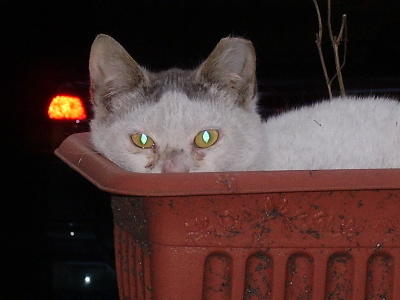
Well, we're facing facts, little Elvis Memphis, the music lover, has not been by for dinner in well over a week. So our feral colony has gone from six to five. This is the sad part of being a caretaker.
It's hard to tell if his twin Elvis Vegas misses him or not. Vegas did let me pet him last night for about 10 minutes while he was eating. Maybe he's getting a clue that the wild life is not his best chance. But Vegas is more of a scrappy survivor too; two nights ago I saw him with a mouse in his mouth.
Both Elvii had been hanging out on the roofs of the garages along the back yards of our block, but that activity has stopped. I hope that Memphis has found himself another colony. There's one at Brooklyn College nearby. And we haven't seen any feline corpses, so it is possible.
But if he's gone to the beyond, I hope he has found some Mozart there, and plenty of good food. We miss him.
Noticing What He Notices
Wednesday, September 14, 2005
I Can't Stop Looking at This Cat
What Really Happens on the 4 Train
I, for one, am impressed with her Yankee ingenuity. So I don't judge. I don't even laugh. I only bow in awe.
Wait...I ride that train! What car was that on?
Seriously, if you haven't read the blog, it's great. I check in daily. Bead Lady gives appropriately-delayed dispatches from her volunteer work at a shelter for teens, loves her cats and her smart young friend Sam and her awesome domestic partner, and despairs over the bourgeouis experience of her upcoming commitment ceremony. Oh, and she has a book coming out soon too. Enjoy!
"Fractals," Memory, Process, and Thad Rutkowski
Should be required reading for the University of Autodidacts, I think. If you're majoring in writing, that is. Whether you call them "crots," or "snapshots" or "fractals" (my new favorite), Thad is a master of the terse fictional fragment, the standalone moment, and the puzzle of fitting such moments into a whole.
Sunday, September 11, 2005
More Weeds (The Cute Kind)

Just when I thought I was done photographing weeds for the day, these guys had to go and be cute. Here are 3 of our backyard feral colonists, Elvis Vegas, Marcel, and Rrose, having a nap in this unsuccessful shady flowerbed. They tend to sleep in piles, even when it's hot out. Part safety-in-numbers, part family bonding.
My Ass is Feeling Grateful Today

Glad to be alive and not at work today.
The volunteer morning glories have been threatening to take over all summer, and even though I know each one of these flowers is gonna turn into more seeds, I'm grateful for the abundance. I love them! For now.
And my sweet husband too. Look at the coolio raised bed he built yesterday! Hopefully it will keep kids, dogs, and cars from torturing this little tree. (You can see the morning glories' shadow too.)

Friday, September 09, 2005
Does “It” Belong in Fiction? Part 3: Terror as Metaphor
And stepping back, I realize that for most New Yorkers, those who didn’t lose loved ones, “It” happened fairly quickly, then became a charged backdrop for our daily lives, or the new ones that we were leading, given displacements, heightened security (and maybe too the loss of personal freedoms, though I won’t go there today), and the changed cityscape. I’ve been wracking my brain trying to think of literature that captures this feeling. There are numerous examples of “post 9/11 fiction,” but this moniker has a slightly different meaning. “Post 9/11 fiction,” in my understanding, is about our “new” world, post loss-of-innocence, and many writers have been using metaphor to point to the event and its cultural implications. But it’s hard to find work that uses the event itself as mere setting, allowing its own metaphorical properties to comment on other, unrelated human dramas.
In other words, stories that are inside “It,” but are not about “It.”
Maybe using “It” as setting can be most easily accomplished in film. Jane Campion’s “In the Cut,” an adaptation of Susanna Moore’s novel, has some of what I’m seeking. The novel, published in 1999, is an exploration of the dark side of one woman’s sexuality, part who-dunnit thriller, part Mr. Goodbar, part poetic-textual analysis. But filmed in the surreal cityscape of the new downtown (Summer 2002? Autumn 2001?), the markers of change loom red-white-and-blue in the background, and throw another dimension of threat onto the protag, Frannie, as she continues to have sex with the cop she suspects is a murderer.
Conventional wisdom might dictate that the scarred buildings and ashy flags in the background could be distracting, maybe even gratuitous. My friend Jon Baskin filmed “Beef,” a documentary about poets, pre-“It,” then in fall 2001, scrambled to remove footage of the intact World Trade towers before sending it to festivals. I fought him on this choice—“it’s a record!”—but he was right. The film is a fully upbeat tour of free speech and po-culture, and allowing innocent pans of the towers to remain would have felt like a cheap trick.
But letting the cityscape speak for itself is an intentional move in Campion/Moore’s “In the Cut.” We see the dust in the warm yellow light. In the beats between lines, Frannie looks at the black shell of the building just south of the WTC emptiness. She watches strangers carry an enormous funeral wreath on the subway platform. But too, she observes a bride and groom through the train windows, and images begin to bleed: the Poetry In Motion verse she copies in her notebook, the same words on the tee shirt of a sexy teenager on a Tribeca stairway. Frannie is a writer herself, and in Meg Ryan’s pensive portrayal, the dream of metaphor and language overwhelms the canned signifiers of “It” all around her. And as the serial killer literally “disarticulates” dead women, Frannie becomes “disarticulated” herself, quietly building and breaking connections between the words and images in her surroundings.
The result is an accurate portrayal of the city’s post-crisis mood, that of continuing life but constantly acknowledging mortality and murder. The threshold of mortality is both sexy and scary. Or, as one of my Merrill Lynch co-workers said, “Everybody was fucking on the night of September 11.”
Okay, but I’m not trying to make films. How can this effect happen on the page? I haven’t found a perfect example, but…
Arthur Nersesian is a true New York novelist, and in his latest, UNLUBRICATED, he allowed “It” into the narrative. It wasn’t a matter of writing a 9/11 novel. Nersesian’s work is about artists and subcultures of a particular place and time, and UNLUBRICATED is the latest in his continuous oeuvre. (BTW I don’t think it’s his best…that would be DOGRUN,.) But unlike “In the Cut,” Nersesian’s work is largely comedy-of-manners. So how much time and/or distance is necessary to make “It” funny?
Nersesian took the opposite route, no distance at all. The funny characters happen to travel through “It.” His actress narrator, Hannah, finds herself in a jumble of evacuees downtown on September 11, and befriends a stranger, as many of us did. But then the terror and tragedy become more of an economic obstacle, as Hannah struggles to pay bills and produce the feminist play, “Unlubricated,” a loose nod to Valerie Solanas, the real-life gal who shot Andy Warhol. (The play itself is about a community of artists— Nersesian’s calling card—a writer’s group in this case.) Confusing enough? That’s the point. The book is full of Nersesian moments—appointments almost missed, money barely made. But foremost, the novel is true to its voice and its literary context, the quirky, “cult,” insider view of the New York underground that only this author has found.
Nersesian’s critics have poo-pooed him for not truly “taking on” the terrorist attack, for letting it in without letting it take over. I firmly disagree. While light in tone, the chaos does inform the narrative, the way chaos does, delivering both difficulty and opportunity in a high-speed simultaneity. I’m not looking to write another UNLUBRICATED. But this reader, for one, is glad Nersesian had the courage to let the events of his time be a part of his ongoing setting.
Perhaps most importantly, the “It” of 9/11 brings to mind the other “It” taking place right now. It may be too early to think about the bigger trauma of the Gulf Coast in the same way. Perhaps the writers of that region will need to tour the changed landscape themselves, go beyond the canned and politicized images we get on CNN, into their own charged memories and continuous oeuvres. I, for one, am eager to see what they deliver.
Last night I spoke to a New Orlean who has been living in New York for some time. He said, surprisingly, that he is eager to go back. I think of the breathtaking footage in Jim Jarmusch’s “Down by Law,” and the same houses now submerged, and wonder what these images will mean to those who have lived there for some time. Call it apolitical and banal, but is the narrative I crave, after all the disrupted lives find new traction, and all the yelling and blaming is done.